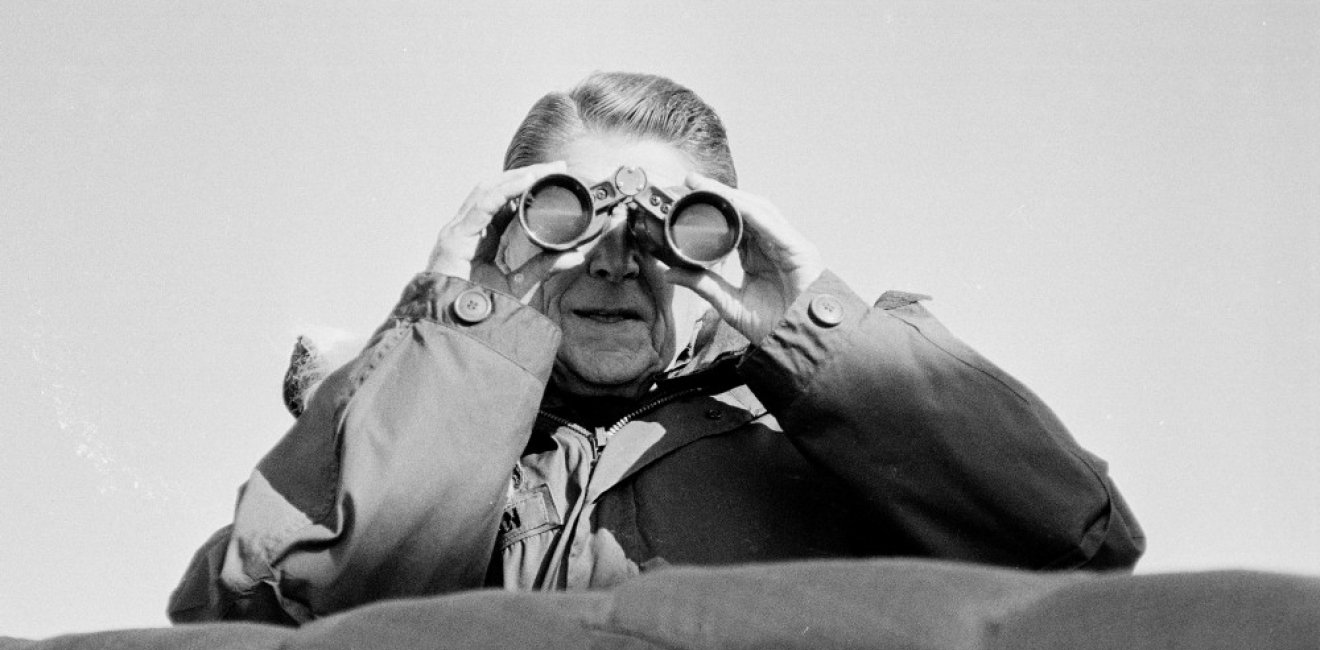Nuclear Tests Are Not What You Think
The United States bargained with Israel, Pakistan, and South Africa to stave off nuclear tests. Can it do the same in North Korea?

A blog of the History and Public Policy Program
The United States bargained with Israel, Pakistan, and South Africa to stave off nuclear tests. Can it do the same in North Korea?

Above: Reagan observes North Korean positions at the DMZ, November 1983
The United States bargained with Israel, Pakistan, and South Africa to stave off nuclear tests. Can it do the same in North Korea?
The Punggye-ri site in North Korea appears primed for a nuclear test. Waiting for the order, personnel now pass the time by playing volleyball, with one suspected “volleyball net set up at the command center area”.
Observers of nuclear history will recall that this is not the first time that ball games played a role in nuclear test preparations and their detection. India prepared and conducted a series of nuclear tests in May 1998 that took the US intelligence community by surprise. As preparations concluded at the Indian nuclear site, the local team put together a football pitch “and played almost every evening”. Secrecy was maintained with the aid of the football ploy, and the preparations were not detected. George Tenet, than head of the CIA, confessed in his memoir that “we didn't have a clue”, and former diplomat Strobe Talbott added that the state department had learned about the tests from CNN.
Why is Washington so interested in detecting nuclear tests, and why do they receive so much attention? After all, North Korea already conducted five nuclear tests, so why do we care about the sixth?
Nuclear tests help scientists validate their designs and improve their technology. But they are also loud, crass demonstrations of nuclear capabilities, aimed at domestic and foreign audiences. They are not obligatory in the development of a rudimentary nuclear capability, under certain conditions. The United States did not test its gun-type enriched uranium device before using it to decimate Hiroshima in 1945. Similarly, Israel is understood to have developed its initial nuclear capabilities without overt testing, at least until 1979.
Nuclear tests, and the efforts to prevent them, play an important role in US thinking on nuclear proliferation and its prevention. International archival research shows how tests affected bilateral relations with the United States. During the Cold War, Washington tried and failed to prevent Israel, South Africa, and Pakistan from developing their own indigenous nuclear arsenals. Unable to stop the programs outright, Washington had more success reaching deals to prevent tests and public declarations of nuclear capabilities.
Henry Kissinger first outlined the logic of preventing nuclear tests in 1969, in the Israeli context: “In this case, public knowledge is almost as dangerous as possession itself. This is what might spark a Soviet nuclear guarantee for the Arabs, tighten the Soviet hold on the Arabs and increase the danger of our involvement. What this means is that, while we might ideally like to halt actual Israeli possession, what we really want at a minimum may be just to keep Israeli possession from becoming an established international fact.”
Kissinger’s point about the dangers of ‘public knowledge’ reflects the fact that nuclear capabilities do not appear overnight. They develop over time and are often treated as ‘hot potatoes’ passed on to incoming administrations by outgoing peers that could not (or would not) curtail them.
Once a capability is achieved, the picture changes. During President Reagan’s first months in office, his administration produced a policy paper that addressed the conceptual difference between policies aimed at preventing proliferation by “nuclear hopefuls” and policies to handle states that had already crossed the threshold. It grimly concluded that: “our efforts will also have to deal increasingly with controlling the results of proliferation in addition to preventing it.”[1]
While these three Cold War deals with Israel, South Africa, and Pakistan are often seen as policy exceptions, they are a logical continuation of US efforts to prevent nuclear proliferation—when prevention fails, promote a second-best alternative. But in this respect the North Korean case is starkly different. Israel, South Africa, and Pakistan were all aligned with the United States during the Cold War. Common interests facilitated the conclusion of a deal in all three cases.
North Korea stands to gain more by defying the US and continuing its game of nuclear brinkmanship than by coming to the negotiating table. The United States cannot bend all actors to its non-proliferation agenda and, as my 2014 book Bargaining on Nuclear Tests shows, political pragmatism has often led Washington to learn to live with nuclear programs it did not approve of. The question is—will the Trump administration learn to live with a North Korean nuclear program?
[1] “Full paper of the Senior Interagency Group on Nuclear Non-Proliferation and Nuclear Cooperation, attached to Memo 8117659 for Mr. Richard v. Allen from L. Paul Bremer III”, June 7, 1981, NSC00014, 12 June, 1981 [non-proliferation and peaceful nuclear cooperation policy], Box: NSC 11-20, Collection: Executive Secretariat: Meeting files, Ronald Reagan Library.


A leader in making key foreign policy records accessible and fostering informed scholarship, analysis, and discussion on international affairs, past and present. Read more


The Nuclear Proliferation International History Project is a global network of individuals and institutions engaged in the study of international nuclear history through archival documents, oral history interviews, and other empirical sources. Read more


The North Korea International Documentation Project serves as an informational clearinghouse on North Korea for the scholarly and policymaking communities, disseminating documents on the DPRK from its former communist allies that provide valuable insight into the actions and nature of the North Korean state. Read more


The Cold War International History Project supports the full and prompt release of historical materials by governments on all sides of the Cold War. Read more



